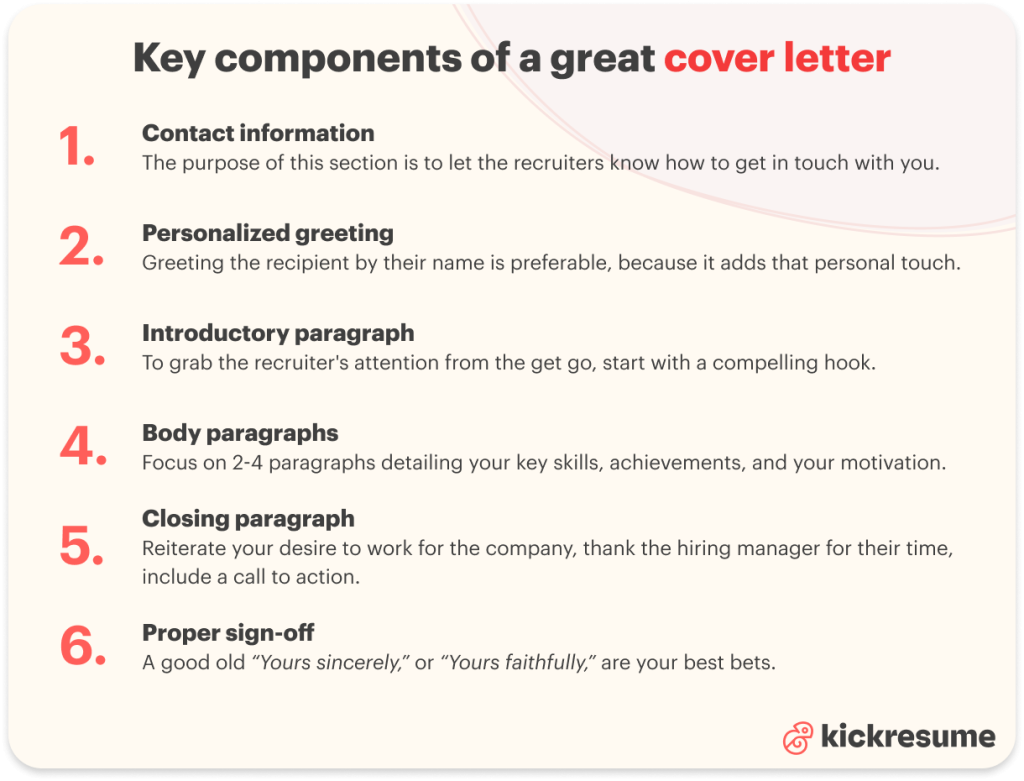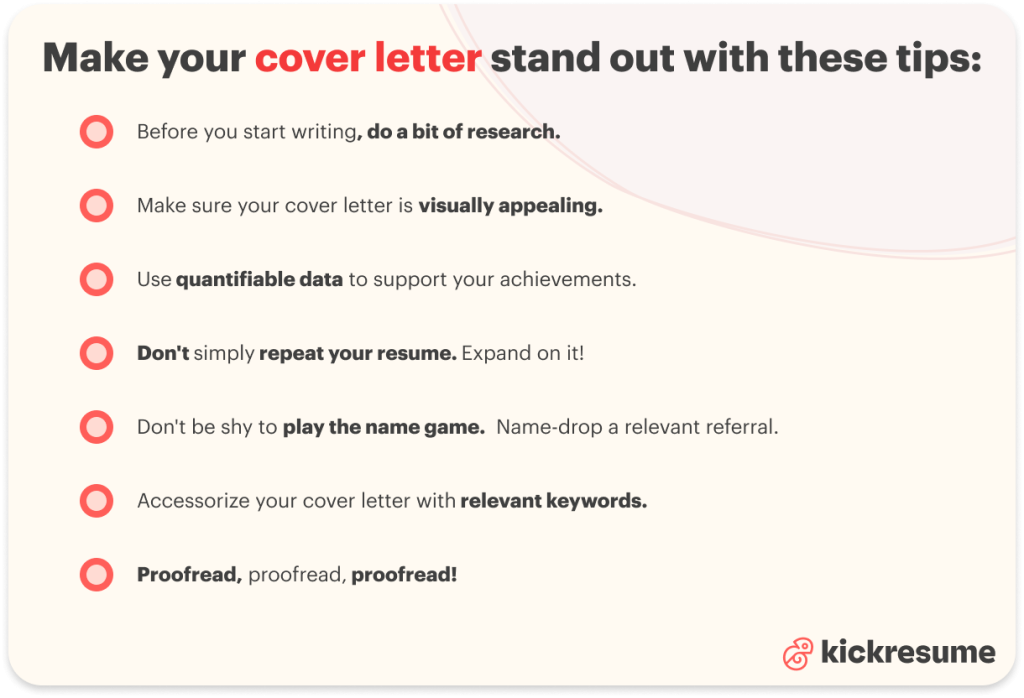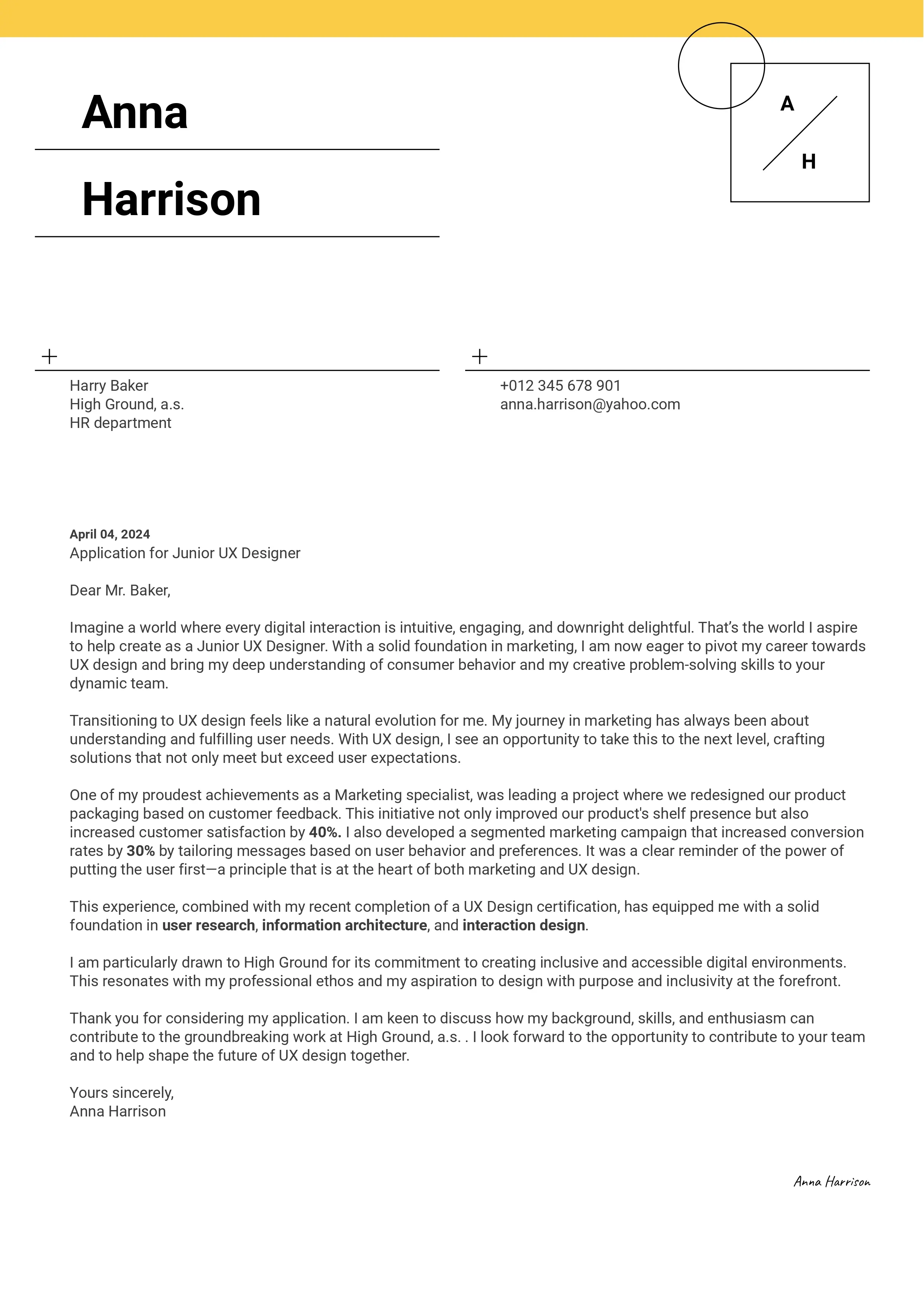When you sit down to write a cover letter, one of the first questions that might pop into your mind is: How long should a cover letter be?
Too long, and you risk losing the reader's interest.
Too short, and you might not convey enough about why you're the perfect fit for the role.
So, what's our recommendation? The ideal cover letter is somewhere between half a page and a full-page long.
If you want to learn how to use this relatively small space to its fullest potential, keep on reading this article and find out:
- What is a cover letter and why you need one;
- How long should a cover letter be;
- What are the key components of an effective cover letter;
- 7 tips that will make your cover letter stand out.
What is a cover letter and why you need one
You can think of a cover letter as your personal introduction to the employer.
And because recruiters usually read your cover letter before your resume, the responsibility of making a positive first impression lies on this compact document.
Similarly to a resume, a cover letter gives you the space to explain why you're the best candidate for the job and how you can contribute to the company.
But since both resume and cover letter are so similar, isn't writing one just a waste of time?
Well, as research shows, 87% of hiring managers would strongly disagree! In fact, 49% of hiring managers admit to having invited candidates to a job interview even if their resume was weak. And that's just because of the quality of their cover letter!
So, yes, taking your time to craft a compelling cover letter does make a difference.
But if you're still not convinced, here are 3 more reasons:
- Getting your personality across. While a resume shows the facts and figures of your professional life, a cover letter allows you to add a personal touch to your application. It’s your opportunity to speak directly to the hiring manager and show a bit of your personality.
- Showcasing your knowledge. It’s also a chance to show that you’ve done your research about the company (its needs, values, and challenges) and the role.
- Explaining career gaps or changes. Additionally, if you have gaps in your employment history or are changing careers, your cover letter is the best place to address these points.
In short, you should always attach a cover letter to your job application. Even if the job posting you're responding to doesn't ask for it.
How long should a cover letter be?
And now, let's get to the real reason why you're here.
This is how long the ideal cover letter should actually be:
- Word count: Try to hit the 250 - 400 words range. This should be long enough to cover the essentials but short enough to keep the reader's attention.
- Number of paragraphs: When it comes to structure, your cover letter should consist of 2-4 body paragraphs, framed by an introductory and a closing paragraph.
- Pages: Overall, your cover letter should be between half a page and a full page in length.
Anything longer would defeat the purpose of a cover letter, which is to present yourself concisely and straightforwardly.
Key components of a great cover letter
As you can see, a cover letter is a relatively compressed medium. So how can you make the most of its limited space?
We’ll show you which elements shouldn't be missing from any cover letter:
- Contact information
- Personalized greeting
- Introductory paragraph
- Body paragraphs
- Closing paragraph
- Proper sign-off

And now, let's zoom in on each of these separately!
Contact information
Firstly, you should place your contact information at the very top of your cover letter. Make sure you include:
- your full name,
- e-mail address,
- phone number,
- and link to your LinkedIn profile/online portfolio (optional).
For the sake of conventions, you should also include the contact information of the recipient of your cover letter:
- their name,
- the name of the company,
- the company's address.
The main purpose of this section is to let the recruiters know how to contact you. So, keep in mind that your contact details should always be visually distinct from the rest of the text.
Personalized greeting
When it comes to cover letters, starting off on the right foot is crucial. So, instead of a generic salutation, you should address the recipient of your cover letter by their name, like so:
- “ Dear [First Name] [Last Name], “
- or “ Dear Mr./Ms./Dr. [Last Name],”
But how can you figure out the hiring manager's name? Well, ideally you'll see it in the job posting. If not, you can check the company's website, LinkedIn profile, or give them a quick call.
Greeting the recipient by their name is certainly preferable, because it adds that personal touch. But there are ways to address a cover letter without a name and still make a great impression.
Introductory paragraph
Thirdly, you need to open up your cover letter with a bang!
Since the purpose of the opening paragraph is to catch the recruiter's attention from the get go, you need to start with a compelling hook.
But there really isn't just one way of achieving this. For example, your introduction can look something like this:
Introductory paragraph example #1: Mentioning key achievement
Introductory paragraph example #2: Showing particular interest in the company
Introductory paragraph example #3: Sharing a personal story
Body paragraphs
Of course, the main focus rests on your body paragraphs. And once again, nothing is set in stone. Well, at least regarding the number of the paragraphs (2-4).
But when it comes to their content, the most successful cover letters address the following:
- Showcasing your skills and experience. But don't just list your skills and be done with it. Instead, put your skills into a real professional context. Describe a problem you've encountered in your previous job and the skills you utilized to solve it. Don't forget to also mention your results.
- Presenting your most illustrious achievements. Whether you've obtained a certificate vouching for your skills, or any awards and recognitions, mention it! Because this might be just the thing that sets you apart from the competition.
- Expressing your motivation for joining the company. For example, you can mention a particular project, company values, or goals that appeal to you. And be specific — recruiters don't like vagueness.
- Demonstrating your passion for the role. Finally, you need to show that you not only have the necessary skills and experience, but also passion and genuine interest in the profession.
You can either go for the 4-body paragraph structure, dedicating each paragraph to a different topic, or combine them as you see fit. In either case, the flow of the text has to make sense!
Closing paragraph
When you’re writing your closing paragraph, keep it short and sweet. Ideally, you'll do these 4 things:
- Reiterate your desire to work for the company.
- Thank the hiring manager for their time and consideration.
- Express your desire to discuss further steps in-person (a.k.a. a call to action).
- (Optionally) remind them how they can get in touch with you.
Don't know how to finish on a high? Let these 8 great cover letter endings be your inspiration!
Proper sign-off
And finally, you need to wave the hiring manager goodbye professionally.
There's no need to come up with anything original. On the contrary, a good old “Yours sincerely,” or “Yours faithfully,” are your best bets.
Cover letter example
Here's an example of what a good cover letter can look like.
But this isn't just any old sample! It belongs to a real person who got hired with the help of our beautiful cover letter templates.
So, if you like what you see, don't be shy and go explore!
More cover letter samples
But what if you’re currently switching careers or trying to get an internship? Don't worry, we haven't forgotten about you either.
Here are 4 more samples, two for each of these situations.
And if you happen to fancy any of them, just click on the red button in the bottom right corner and adjust the chosen sample to your liking.
How long should a cover letter be for an internship
The ideal length of your internship cover letter will probably be closer to a full page.
Since you don't have much work experience, if any, you need to dedicate more space to proving that you have what is needed to be successful. Instead of work, you can talk about your:
- academic achievements,
- relevant coursework,
- dissertation project,
- extracurricular activities that add to the internship position,
- volunteering,
- or membership in relevant societies.
How long should a cover letter be if you're changing careers
On the other hand, career change cover letters must focus on any transferable skills you've picked up in the past and that can be useful for your new career position. In this case, your cover letter will also probably be closer to a full page.
Also, you need to explain the career pivot you're currently undergoing. Your cover letter should answer the following questions:
- What's the reason for the switch?
- What useful skills do you have?
- How can your expertise add value to the company?
Just to be clear, you'll eventually have to address the career change. And the sooner, the better. So don't be afraid to slide this information straight into your introductory paragraph.
Are these samples not enough? In case you'd like to see more, feel free to browse through our cover letter database. Inside, you'll find even more samples submitted by real people and also those created by our professional resume writers.

7 tips that will make your cover letter stand out
You know what's even better than a well-written cover letter? An outstanding cover letter, of course! So, what can you do to elevate yours? We've gathered the best writing tips that have stood the test of time:
- Before you start writing, do a bit of research.
- Make sure your cover letter is visually appealing.
- Use quantifiable data to support your achievements.
- Don't simply repeat your resume.
- Don't be shy to play the name game.
- Accessorize your cover letter with relevant keywords.
- Proofread, proofread, proofread!
Let us expand on them a little more!
Tip #1: Before you start writing, do a bit of research
Gathering information about the company's projects, values, goals, initiatives, or even challenges gives you massive advantage. Firstly, it helps you tailor your cover letter so it fits the company's needs like a glove. Secondly, showing that you know about the company's struggles and mission creates the impression that for you it's not just about the money.
Tip #2: Make sure your cover letter is visually appealing
Because the last thing recruiters want to see is a wall of text that's difficult to read and doesn't even make sense. Instead, work with white space and keep your paragraphs neatly organized. You can also use bullet points to make your cover letter more structured.
Tip #3: Use quantifiable data to support your achievements
Including numbers in your cover letter is an excellent way to communicate your potential — they’re specific, universal, and impactful. For example: “I led a team that developed a customer relationship management system that increased client retention by 30% within the first year.”
Tip #4: Don't simply repeat your resume
Sure, some of the information you include in your cover letter is bound to be repeated in your resume. But instead of copy-pasting, try to provide more context. For example, why was this particular result so essential for your former team. Or, what makes you so determined to get this job (apart from the salary, of course).
Tip #5: Don't be shy to play the name game
If you know someone who's already working for the employer, make sure you name-drop them in your cover letter. Having that personal connection always helps. For once, it makes the recruiters trust you more. And it's also a good indicator that you're likely to fit in with the company culture.
Tip #6: Accessorize your cover letter with relevant keywords
This tip is especially valuable if you're submitting your job application through the ATS. Because without the right keywords, your application might not even reach the recruiters’ eyes.
But how to find out which keywords to include? Well, you need to start by reading your job posting carefully. Take note of any words or phrases that describe candidate requirements (for example skills, degrees, responsibilities, industry-specific words, etc.). Then, sprinkle these keywords naturally throughout your cover letter.
Tip #7: Proofread, proofread, proofread
And finally, we recommend you to always go through your text multiple times! Because nothing can ruin the first impression quite like stupid and unnecessary mistakes such as typos, grammatical errors, or misspellings.
Key takeaways: How long should a cover letter be
The purpose of a good cover letter is to present yourself as the best candidate for the job in a concise and straightforward manner.
That's why you should always aim for 250-400 words; 2-4 body paragraphs (framed by an introductory and a closing paragraph); and a layout that’s between half a page and a full page in length.
Despite this humble space, you should be able to cover the following sections:
- Contact information
- Personalized greeting
- Introductory paragraph
- Body paragraphs
- Closing paragraph
- Proper sign-off
FAQ: How long should a cover letter be?
- How long should a cover letter be in terms of word count?
A good cover letter should be between 250 to 400 words. This range is long enough to cover all the necessary points but short enough to keep the reader's attention.
- How many paragraphs should a cover letter have?
Typically, a cover letter should have 2-4 body paragraphs. These should be framed by an introductory and a closing paragraphs. Ideally, each paragraph should serve a specific purpose and be concise.
- Should a cover letter ever be longer than one page?
No, a cover letter should never be longer than one page. Keeping it to one page ensures that you present your qualifications concisely and respect the hiring manager's time.
- What happens if my cover letter is too short?
In that case, you’re running the risk of not providing enough information to make a compelling case for why you're the best fit for the job.
- Can a cover letter be less than half a page?
While it's possible, a cover letter less than half a page might not fully showcase your qualifications and interest in the position. Try to write at least half a page to ensure you cover all essential points without overwhelming the reader.








